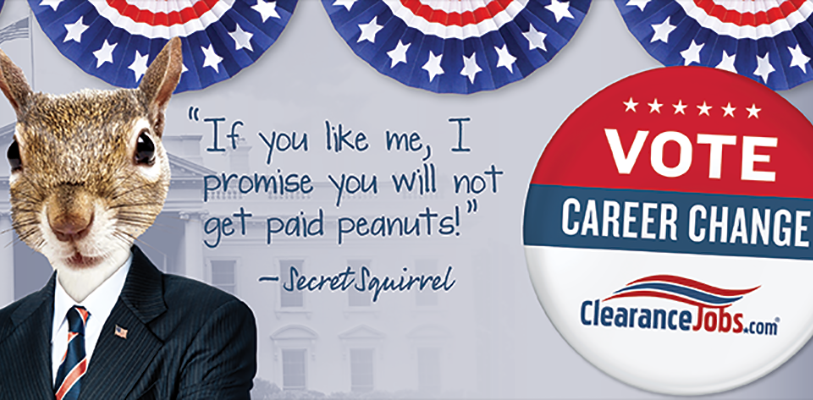Sick of campaign politics? So are we. That’s why we’re voting for #SecretSquirrel2016. Join the movement.
Whether you love politics or hate them (or feel bound by the Hatch Act to reserve all opinion), you can’t escape them this time of year. While you’re free to tune out much of the campaign rhetoric, there are lessons to be learned. Here are five campaign tips that directly apply to your job search and career networking.
1. Start Early
Campaign season starts earlier and earlier every year (and if this year was any indication, it includes more and more candidates). While that may be a bit annoying to the general public, it emphasizes the idea that in this crowded news environment, you have to start early to get your message out. For job seekers, the best advice we can often give is to be patient – and never stop networking. If you wait until your contact is cancelled to start networking, you’ll find yourself scrambling to get ahead. If you have a network of recruiters or companies you’d like to work with already in mind, you’ll find yourself ahead of the game. If you start to sour on your current employer, start looking for new positions before you ever consider making a move. Also, give recruiters time to match you with a position. Don’t apply today and expect an interview tomorrow. Just like election cycles take time to run their course, finding the right job takes a lot of patience and persistence.
2. Don’t Forget Your Talking Points
This is politics 101 – always go in with your talking points. Every career professional should have their own tagline or perfected elevator pitch. You might think you’re qualified for every job on the ClearanceJobs website, but that won’t help you land one. Refine your job search, and be prepared to speak to your specific, individualized skills and strengths in any interview.
3. Everything is negotiable
If you’re looking for a principled candidate…you’d better consider someone running for the student council. Politicians are trained in the hard knocks rules of compromise. While compromising your morals is not a good idea, look at each position to which you apply as an opportunity to negotiate. Too many candidates reject a position because it doesn’t fit 100 percent of their requirements. If you’re an unemployed job seeker, in particular, it’s critical to decide what’s essential, and what’s negotiable. You may have minimum salary requirements, but be prepared to compromise on leave policy or telework. If your salary range is negotiable, maybe being able to set your own hours isn’t. Determine your priorities well before the interview, and once you get the offer, be prepared to negotiate to get what you want.
4. The Camera is Always On
Okay, so this is something that most political candidates screw up at some point in the election cycle. But it is absolutely a policy that has caused some candidates to go from top in the polls to the bottom. Networking is important, but it’s even more important to realize that you’re always ‘on’ and something you say or do could cause you to make a bad impression. Whether you’re standing in line at Starbucks or posting a status message to Facebook, it’s a good idea to consider whether or not you’d want your potential employer to hear what you say or see what you post.
5. It’s Not Over Until it’s Over (and even then, sometimes it’s not over)
This one’s for you, Bernie! Don’t count any candidate out (or in) until the final ballot is cast. If you’re an unemployed job seeker, it may feel like you’ve tried everything to land a job, and you simply can’t catch a break. Just when you’re ready to throw in the towel, a great opportunity might come your way. The federal contracting space is incredibly cyclical (just like the campaign process). If you lose on your first try, don’t give up. I talk to candidates on a regular basis who were in the running for a position, but then lost out to another candidate or lost the opportunity due to a contracting funding issue. If those folks had burned bridges, thrown up their hands or bashed their recruiter on social media, they’ve lost any chance of a getting a second chance. In many cases, a recruiter will reach out later (maybe even a year later) when a new opportunity comes up. Today’s loss can be tomorrow’s win – but you have to have a long-term approach, and you can’t take anything personally.
It’s okay to be sick and tired of political campaigns – and sick and tired of searching for jobs. But don’t forget that in both respects, persistence is often the difference between being a winner, and being forgotten.




